Remote work has solidified its position as a prominent trend, evolving traditional workspaces post-pandemic. Key statistics reveal that in America, 12.7% of full-time employees work remotely, and by 2025, it is estimated that that number will reach 22%. Currently, as many as 98% of workers desire remote work, speaking to the many benefits professionals have identified and enjoyed since exploring this modality.
Success in adapting to remote work hinges on various factors such as company culture, values, behaviors, and technology. This ideal combination made the computer and IT sector the top industry for remote work in 2023. It is essential to understand the statistical trends and real-world implications for talent, especially within the tech industry.

Remote Work-Life Study: Insights from 1,000 Remote Professionals
The Remote Work-Life Study surveyed 1,000 remote professionals on our team to understand what makes remote work a game changer for tech talent. We’ll uncover its effects on productivity and communication. Beyond the professional setting, we’ll dive into the human side of things, looking at tech talent’s familial and personal environments.
Key highlights of the study include:
- 91% of respondents agree that remote work enhances their productivity, highlighting the importance of a company culture that fosters trust and employee satisfaction.
- 87% of software developers believe their mental health has improved since working remotely. Adopting customized work schedules and prioritizing a fulfilling daily routine allow professionals to be better time managers, synchronize rest and work, and leverage time to explore personal interests and the world around them.
- 75% of respondents agreed that remote work has enabled them to establish a wellness routine, empowering people to take control of their time and lives.
- 91% of respondents agree that remote work contributes to a family’s well-being. According to the study, this work model significantly benefits parents. They can be much more involved in their kids’ lives, witnessing their children’s early developmental years.
- 83% of respondents believe that being there for family is a highly important benefit of remote work. Flexible schedules, reduced stress, and a better work-life balance have a positive impact on familial relationships.
- 94% of software developer respondents believe it is “highly important” or “crucial” for employers to trust in their ability to deliver results for them to thrive in a remote work environment.
About the Sample Demographics
In February of 2024, we conducted a survey of 1,000 remote professionals working at BairesDev. We also carried out in-depth interviews with a sample of our remote talent for detailed accounts. Here are the details of our sample demographics:
- Over 80% of respondents were between the ages 25 and 44, placing most of the respondents in the millennial generation.
- Our sample consisted of 48.22% of software developers, while 51.78% were professionals working across other departments of the company.
- The majority of surveyed professionals started working remotely around the pandemic. Our findings show 80% of them have worked remotely between 1 and 5 years and 18% reported working remotely for more than 5 years.
- Almost a third of our respondents live only with their partner, while a lower but similar percentage reports living with their partner and children. This is particularly relevant, as we’ll touch on the impact of remote work on interactions within home environments.
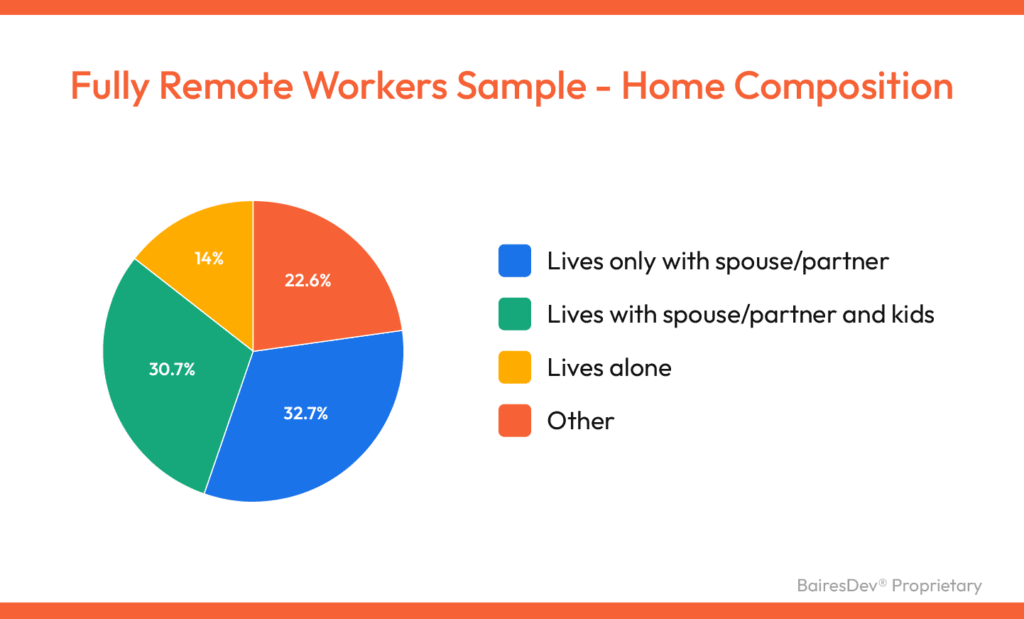
Source: BairesDev
The Impact of Remote Work on Productivity
Concerns about productivity emerged as soon as remote work was brought to the table. While it presents professionals with flexibility, it can also pose time management challenges leading to lower performance.
Nonetheless, 4 years after the mass adoption of the model, the impact is mainly positive. The study found that 91% of professionals believe remote work enhances their productivity. The report shows that a contributing factor to productivity is the flexibility to choose a working schedule that allows talent to work when they feel the most productive.
Tyler J. Jensen, Outpatient Psychotherapist, highlights the impact of autonomy on productivity: “We are seeing a reduction in anxiety due to office conditions, commutes, interactions with certain coworkers, and hours of wasted time due to having to clock in and out of the office during rigid time structures. When we are allowed to feel like autonomous adults, capable of managing our own time and environment, the pressure drastically lifts. Over time, this will lead to a reduction in stress, an increase in pleasurable working conditions, more favorable work-related outcomes, and ultimately, more passionate employees.”
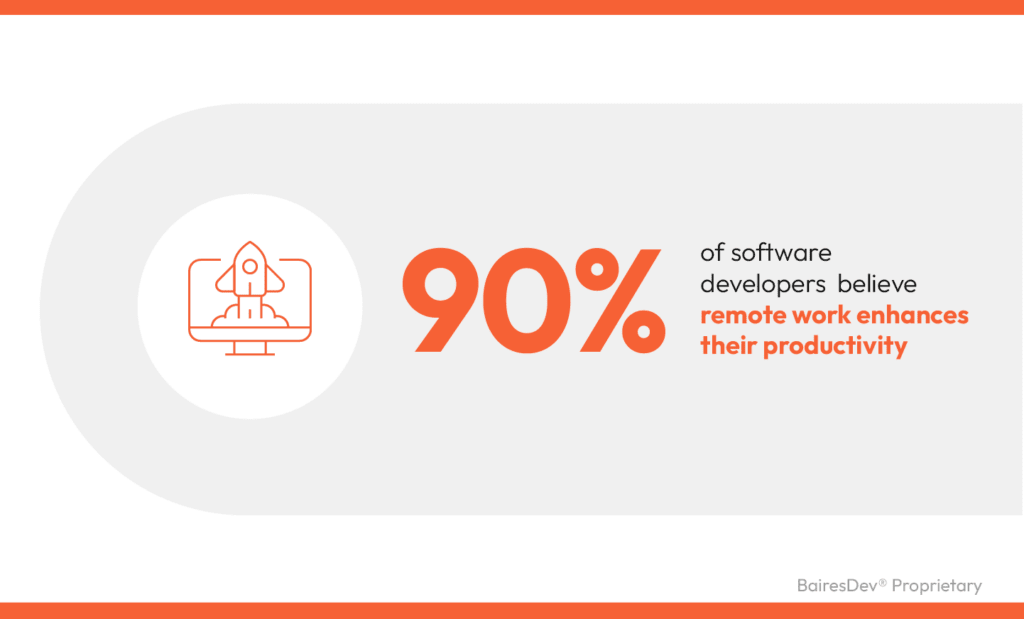
Source: BairesDev
Not working in the office means managers can lose sight of their team’s progress. This is a real obstacle when management practices do not prioritize communication and clarity. We found that leading remote teams requires a heightened level of trust and communication. Ninety-four percent of software developers told us it is “highly important” or “crucial” for employers and managers to trust in their ability to deliver results. Effective communication is essential to building trust, and it goes beyond establishing a good rapport. It’s about having prioritized two-way, solution-providing communication.
Instead of imposing strict adherence to a work schedule or a physical location, managers became enablers who trust in their talent. Their efforts are now focused on outcomes and equipping their team with what they need to succeed. This could be training, mentorship, or removing work barriers.
A professional with the necessary soft skills to communicate and collaborate remotely is set up for success in this model. However, not everyone is fully aware of important soft skills from day one. In this regard, 98% of respondents believe that working remotely has helped them build important soft skills such as time management, adaptability, and collaboration.
This is why prioritizing soft skills in the hiring process has become more important than ever. The tech industry requires skill sets that are constantly evolving. In particular, remote work poses a challenge for those who can’t adapt to new technologies and environments, communicate effectively, or give teamwork the importance it needs to deliver results.
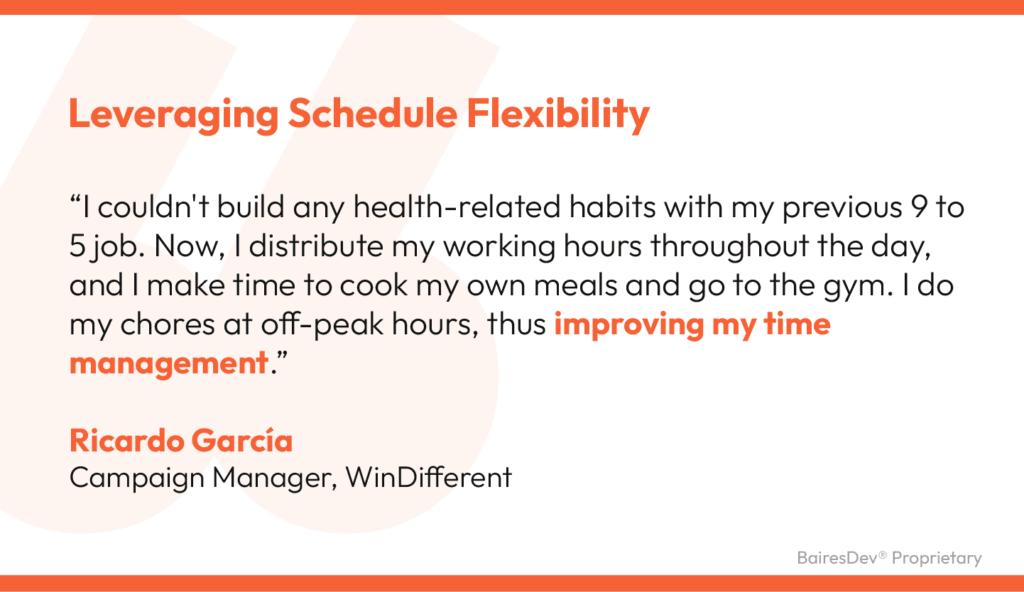
As talent develops soft skills, remote collaboration becomes easier and productivity increases. With work dynamics in place and results-oriented work schedules, talent can explore ways of spending more time with their families and/or pursuing their passions. For example, being able to take care of their family is a benefit that 83% of respondents rated as “crucial” or “highly important.”
Mr. Jensen has taken notice of this as well and believes the nuclear family dynamic will shift. “We will begin to see traditional gender role assignment within parenthood, and task assignments begin to homogenize and evolve into a space where all child-oriented responsibilities that can be carried out by either parent are easily adapted to and taken on by either parent. Due to the flexibility of remote work, hopefully, very soon we can say goodbye to the days when dad comes home and you see him for 10-minutes before he watches the game and dissociates for the remainder of the night.”
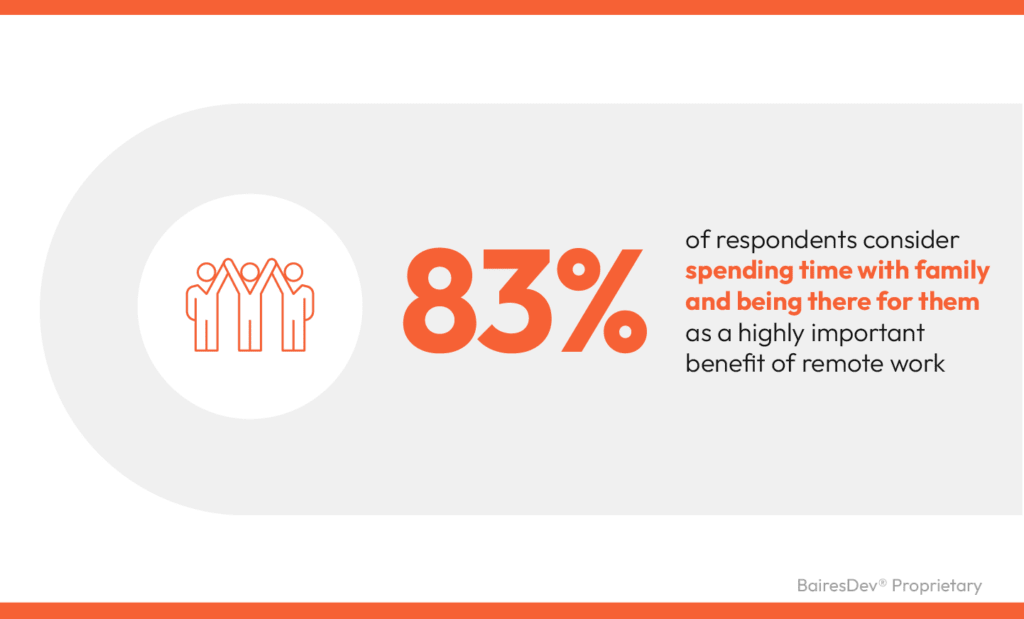
While remote work allows people to be closer to their loved ones, they are also far from colleagues at work. Spending 8+ hours a day at a traditional office provided workers with a social environment. Our survey found that 31% of professionals miss face-to-face interactions with colleagues, while 36% remained neutral. This is because watercooler chats and personal connections enhance workplace camaraderie.
Creating friendships and other social connections at the office was an important part of life, but it didn’t stop. Virtual socialization and digital groups became an increasingly important means of communication. Additionally, organizing events to meet face-to-face not only strengthened social bonds created remotely, but also helped enhance company values and culture. These interactions have been particularly valuable for professionals living alone.
Beyond Productivity: Wellness and Health
With the shift to remote work, concerns about wellness and health emerged. Our homes doubling as offices led to extended work hours and blurred schedules. This resulted in heightened productivity paired with burnout. Now, 4 years post-lockdown, many have attained a better remote work-life balance. As a company with 15 years of fully remote operation, navigating the work-life balance conversation is something we’re accustomed to.
The survey showed that our professionals have more time to build the life they want, with 89% of respondents strongly agreeing that their work-life balance has improved compared to previous in-office experiences. However, 18% still struggle to disconnect from work, particularly because they are more likely to lose track of time or make themselves available for communication outside regular working hours.
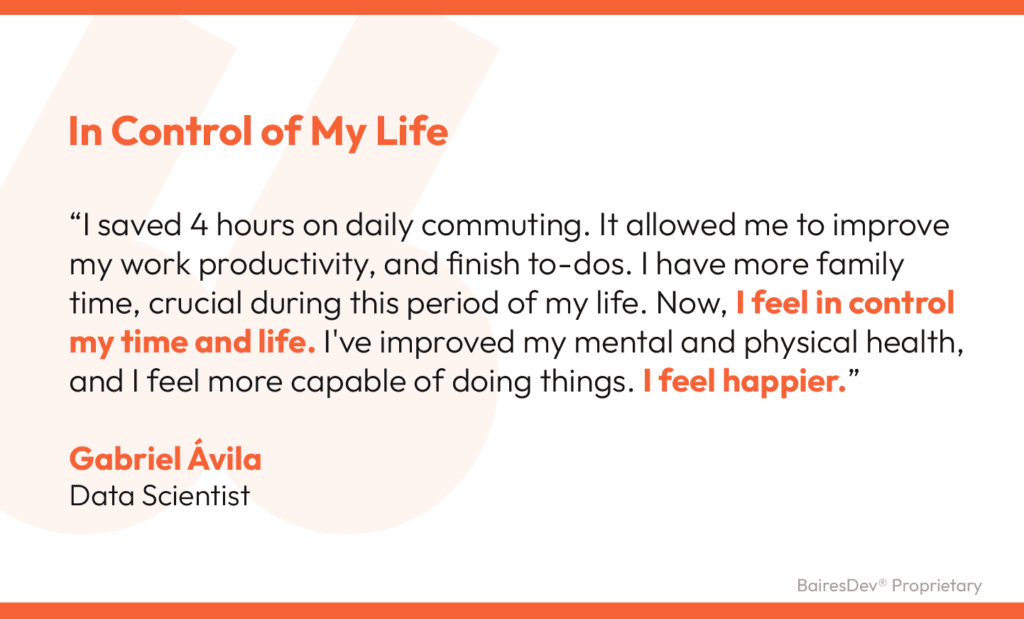
Transitioning to a remote work model required individuals to adapt and become cognizant of their capabilities and constraints. People now recognize the importance of setting boundaries, not only for maintaining performance but also for safeguarding their work-life balance.
Closely related to the work-life balance conversation, the topic of mental health has gained the awareness it deserves. The objective of mental health initiatives is primarily to care for professionals’ confidence and capacity at work, yielding various business benefits. These range from less absenteeism and reduced turnover to increased productivity and greater job satisfaction.
Eighty percent of respondents “strongly believe” their mental health has improved, while 16% remained neutral and only 2% think it hasn’t. Regarding software developers, 87% “strongly believe” their mental health has improved since working remotely. There are many steps one can take to enhance their mental well-being while working from home. One practice that stands out among our team is being able to build their own home office and turn it into an environment that makes work more enjoyable.
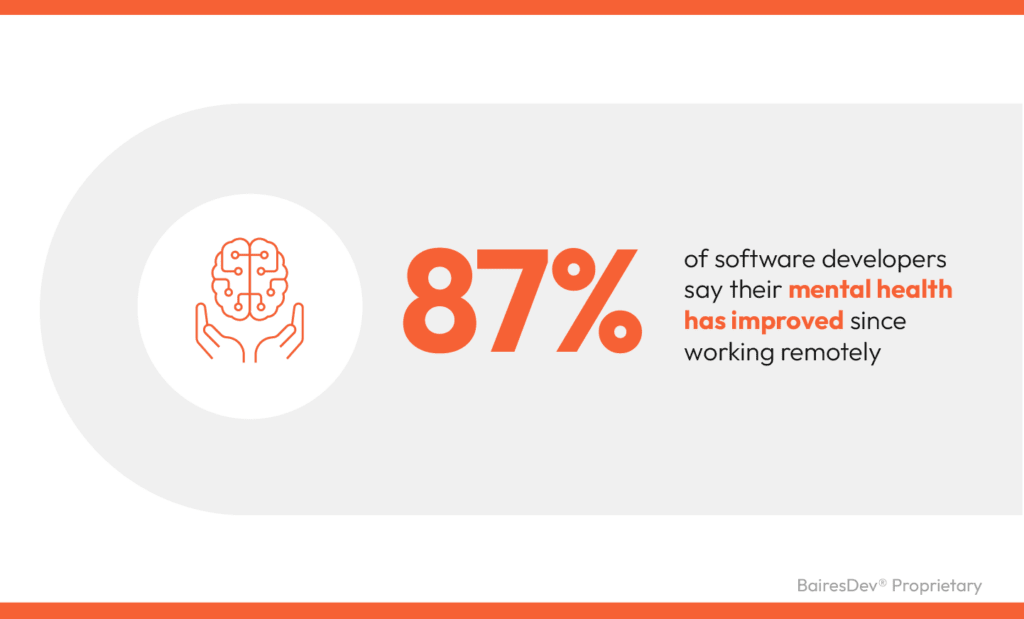
Source: BairesDev
General wellness is also an important discussion in the impact of remote work. When asked about its effects, 75% of respondents agreed that remote work has enabled them to establish a wellness routine. They highlighted benefits such as fitting physical activity into their daily routines, eating balanced and nutritious meals at home, having more time for themselves, and sleeping well.
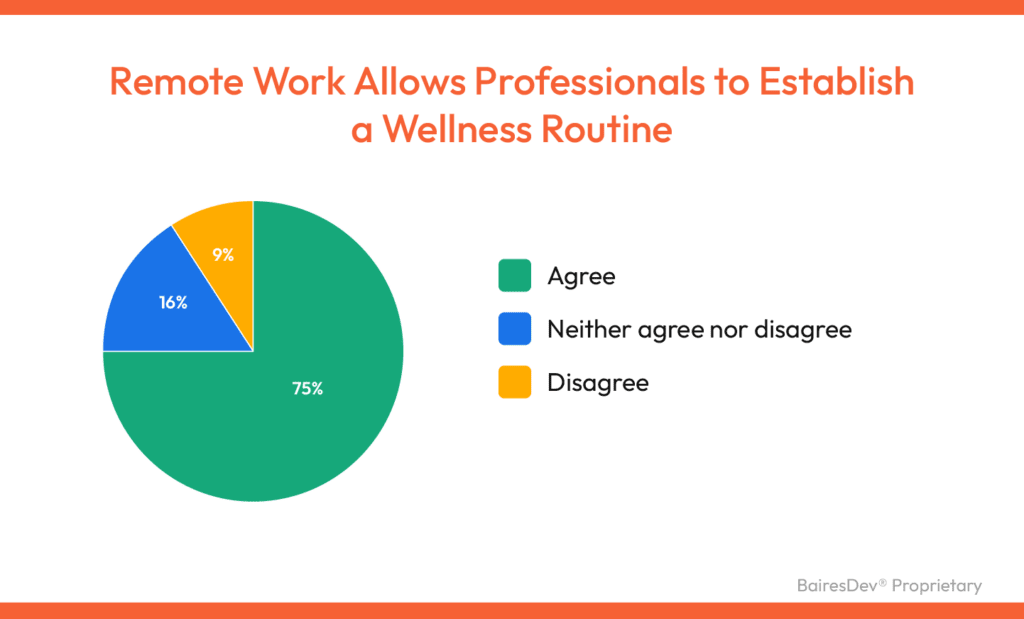
Source: BairesDev
As remote workers defined their optimal work schedules, they also started to pay attention to their daily routines. An important stress reliever that surfaced with remote work is traveling. Professionals have found a way to relax and enrich their lives by exploring new places, visiting relatives, or simply relaxing in another setting. This approach to wellness is enhanced in a way that couldn’t be allowed by an office-bound role with limited PTO or holidays.
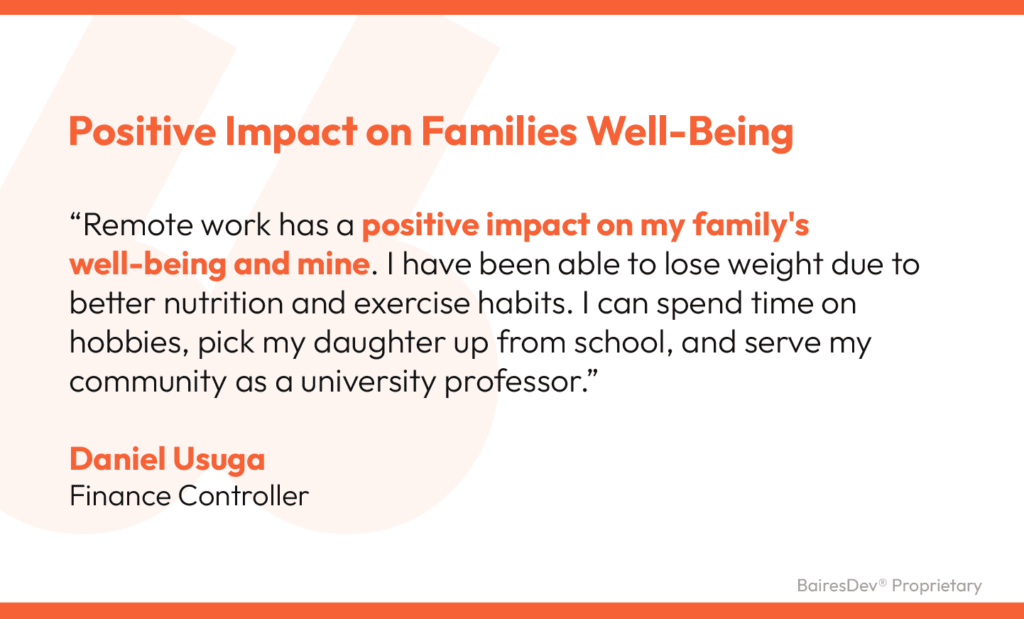
Breaking Generational Parenthood Strains
Benefits like flexible schedules, reduced stress, and a better work-life balance have a positive impact on another crucial area: family life and parenthood. The study found that remote work is helping fathers, in particular, heal father-child bonding struggles. They consider working remotely as an opportunity to, in turn, develop closer connections to their kids, ones that they themselves may not have had. Seventy-nine percent of male respondents said taking care of their family is a crucial benefit of this work modality.
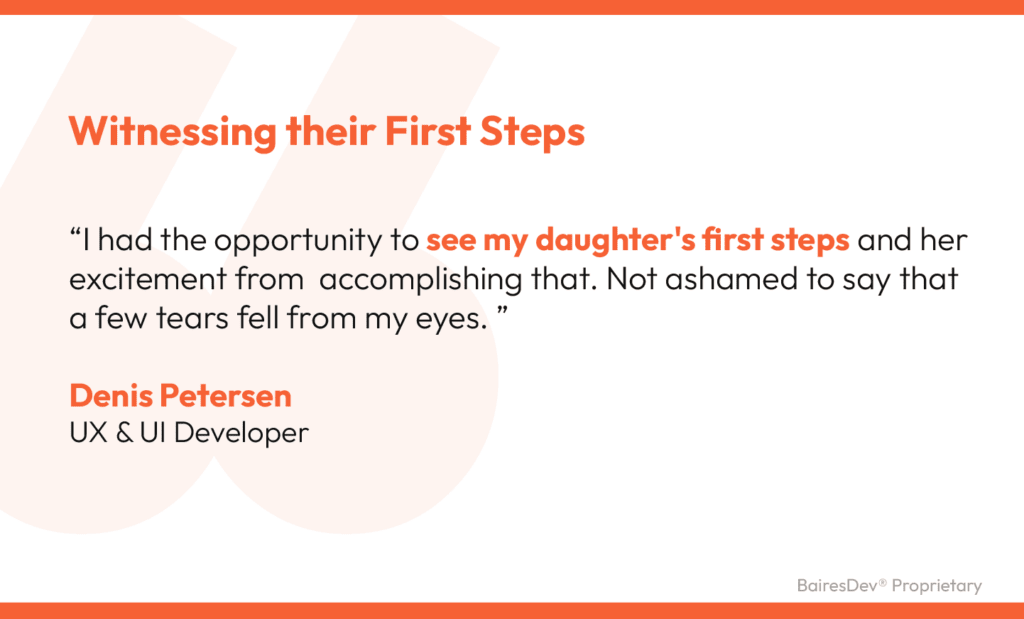
Fathers working in tech regained time to spend with and care for their families, a benefit they don’t want to give up so easily. Nonetheless, both genders reported enjoying the flexibility of remote work. In total, 83% of respondents believe that being there for family is a highly important benefit of remote work. From working parents to adults taking care of elderly members, this model allows professionals to be there when challenging times arise without needing to ask for days off or face an attrition risk.
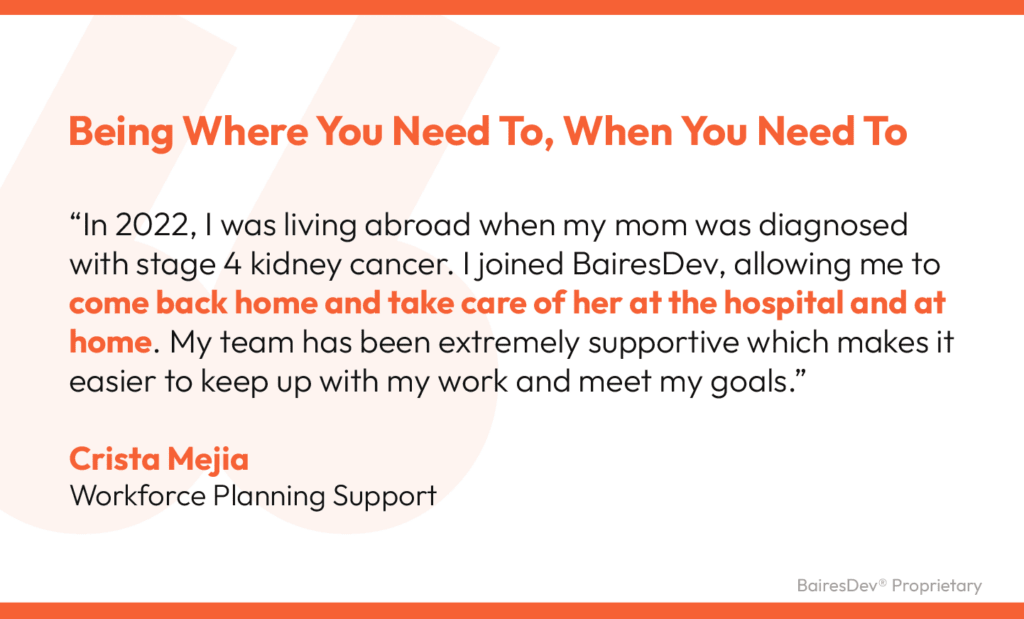
Considering that 86% of respondents who live with their partner and kids have a compatible work schedule, remote work allows for nurturing family relationships and more time for both parents to share with their children.
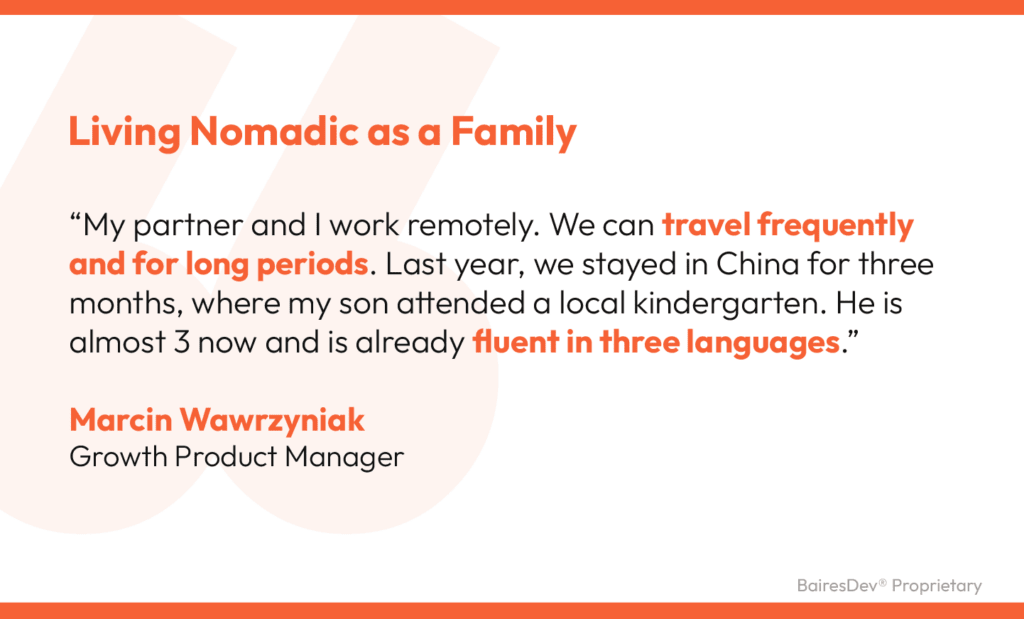
Family dynamics changed for the better. A period of adjustment was necessary for family members to understand their roles, time availability, and needs. Nonetheless, family interactions were positively impacted. We heard from professionals with partners that they could share the household responsibilities equally. Their children adapted easily, understanding their parents’ need for focus during their working hours, while also knowing they could enjoy time with them.
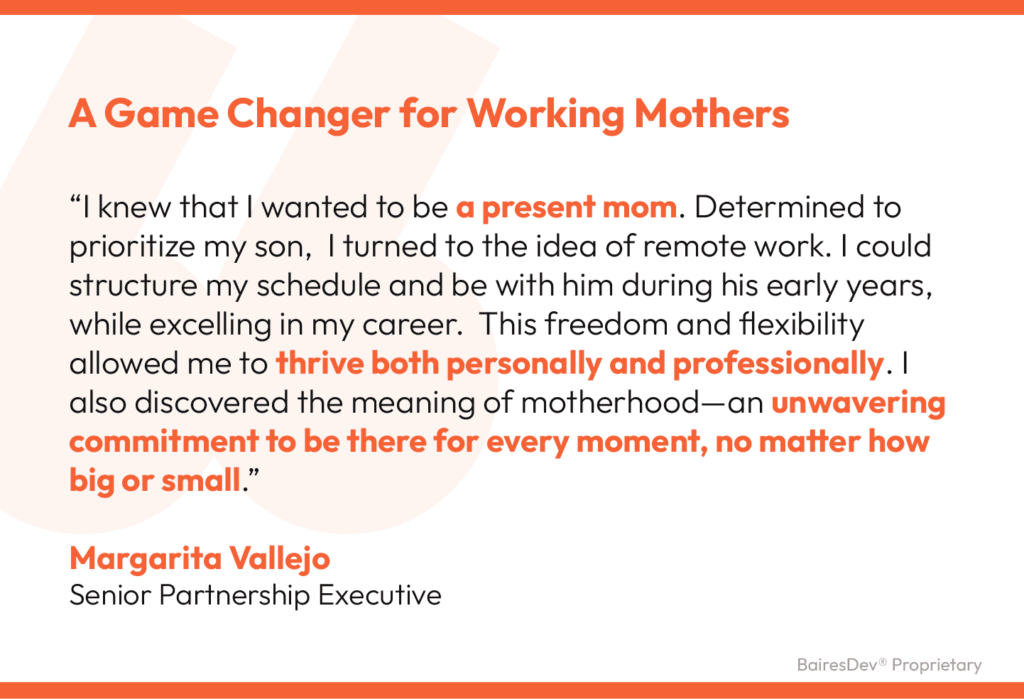
Our Chief Innovation Officer Rocío Belfiore has expressed how remote work has the potential to significantly improve opportunity fairness and support everyone’s professional advancement. This is tied directly to families’ well-being, as parents’ professional advancement contributes to the safety, health, and financial stability of family members. This is why 91% of surveyed professionals believe remote work contributes to a family’s well-being.
Holly Ann Schiff, Psy.D. reviewed our study and concurred, “Working remotely has positive effects both on children’s development as well as family cohesion, which is positively correlated with close emotional bonding, secure attachment styles, and positive social and emotional interaction for children and adolescents at home. Feeling close to parents allows children to more freely express themselves, their thoughts and emotions and decrease negative behaviors and attitudes at home.”
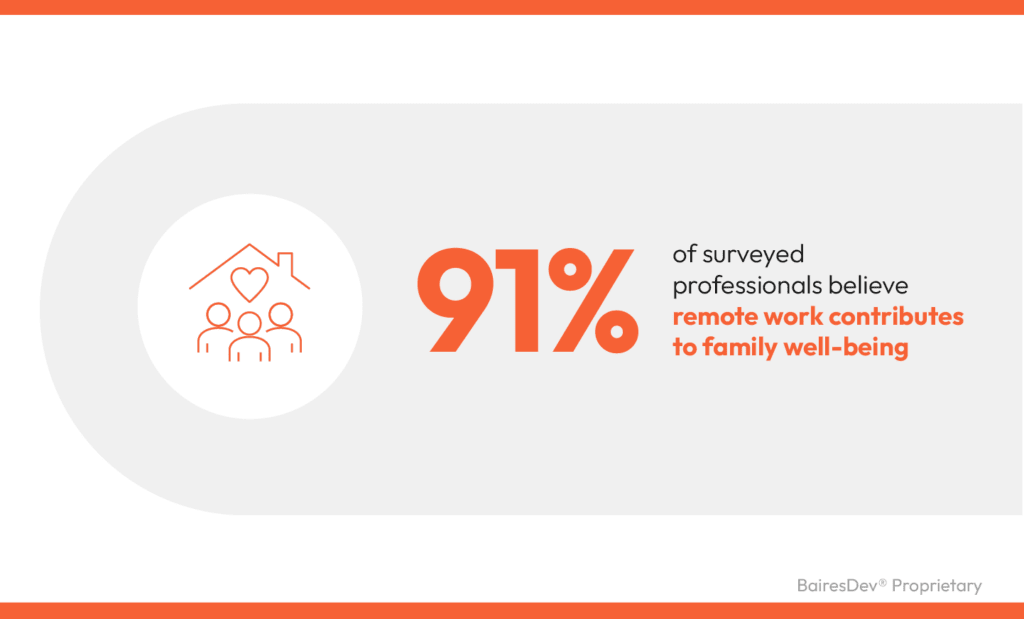
Conclusion
In conclusion, the findings of this Remote Work-Life Study underscore the pivotal role of a flexible working environment in empowering tech professionals. From heightened productivity to better mental health and enriched family well-being, the benefits of remote work are substantial. Yet, these advantages can only be fully realized within a company culture that prioritizes adaptability, open communication, and trust in its workforce.
We encourage leaders to seize the potential of remote work and capitalize on its many benefits. It is essential to prioritize creating a forward-thinking company culture, investing in technology for seamless collaboration, and nurturing the soft skills essential for thriving in remote environments. By embracing these principles, we can pave the way for a future where remote work not only thrives but becomes a cornerstone of success in the tech industry and beyond.






